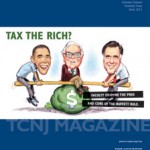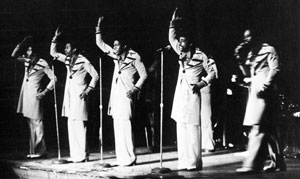Letters: September 2012
Some readers have their say. Find out how you can, too.
Tax talk
 The points presented in “Tax the Rich?” (June 2012) are well stated; however, there are two points that were not made that need to be presented. First, the marginal tax rates on the highest income Americans were first lowered as an economic stimulus (to counter a severe recession) in the first term of George W. Bush’s presidency. These lower tax rates were intended to be only temporary. When the economy recovered (prior to the financial crisis of 2008), the highest rates were never allowed to naturally go back up—obviously a politically motivated maneuver. Secondly, the federal budget is in horrendous condition because of overspending and as a result of these tax breaks being kept in place too long. The president has acknowledged that both large spending cuts are needed, buttressed by revenue increases to create a shared sacrifice vehicle by which to eventually balance the budget. The opposition party will not compromise because it apparently cares about pandering to the affluent more than it cares about balancing the federal budget. So you see, it’s not “Tax the Rich.” It’s about requiring all Americans to pay their fair taxes, not just the middle class.
The points presented in “Tax the Rich?” (June 2012) are well stated; however, there are two points that were not made that need to be presented. First, the marginal tax rates on the highest income Americans were first lowered as an economic stimulus (to counter a severe recession) in the first term of George W. Bush’s presidency. These lower tax rates were intended to be only temporary. When the economy recovered (prior to the financial crisis of 2008), the highest rates were never allowed to naturally go back up—obviously a politically motivated maneuver. Secondly, the federal budget is in horrendous condition because of overspending and as a result of these tax breaks being kept in place too long. The president has acknowledged that both large spending cuts are needed, buttressed by revenue increases to create a shared sacrifice vehicle by which to eventually balance the budget. The opposition party will not compromise because it apparently cares about pandering to the affluent more than it cares about balancing the federal budget. So you see, it’s not “Tax the Rich.” It’s about requiring all Americans to pay their fair taxes, not just the middle class.
James V. Sisti ’68
It concerns me that TCNJ seems to take a position asserting that raising the capital gains tax is not a viable part of the solution…. The other side of the argument could include facts like, “the capital gains rate is currently 13 percent lower than what it was under Ronald Reagan, yet we still have a jobs problem”; “A higher capital gains rate might discourage high-frequency trading and excessive risk taking”; “Capital gains during the 1950s, frequently cited as the good old days, were taxed at 25 percent, while the top bracket rate, starting at $1.5 million in 2010 dollars was higher than 70 percent” (Source: www.ctj.org/pdf/regcg.pdf).
Our system currently taxes money earned by labor at a high rate relative to unearned income. In a nation where income inequality is closer to that in banana republics than other developed nations, it is concerning that our political leaders continue to advocate lower taxes at the expense of spending on social programs, education, and infrastructure. Income inequality in this country has been driven by the pursuit of excessive profits, largely made by the elite class offshoring and exporting jobs at the expense of income and payroll taxpaying jobs at home, yet benefiting from the U.S. market, military, and other infrastructure. Maybe it’s time to pay the piper. Maybe it’s time that we have a higher capital gains rate and a couple more brackets for those making $1 million or more.
Dr. Bruce L. Baird ’94
The article mentions “…From a macroeconomic (or ‘big picture’) perspective, Obama’s Buffett Rule is a ‘reasonable approach’ that would likely cause little damage either to the economy as a whole, or to the Gross Domestic Product or job creation.” This assumes that only the “rich” people will be affected by the Buffett Rule, which may not be the case. It’s my understanding that “S” corporations, which are the majority of small businesses in this country (and the engine of this nation’s economy), pay their taxes under the personal income tax rate to which the Buffett Rule [would be] applied. This tax increase will have an adverse effect not only on small businesses being able to remain competitive in these difficult times; it will also have a chilling effect on the local economy/communities that they serve.
Furthermore, the article does not mention the other taxes and regulations that are being implemented at the same time that will affect small businesses. In addition to the Buffett Rule, taxes and regulations of the Affordable Healthcare Plan are also coming online, and the effects of this double whammy on the economy cannot be good. It will probably result in small businesses not expanding as much (i.e., freezes on hiring new workers) or cutting back (i.e., additional layoffs), and possibly higher costs for the goods and services they provide as some businesses will pass the additional expense to their customers. From a macroeconomics perspective, I have to believe that the Buffett Rule on small businesses all across the country will cause significant damage to the economy on the whole, particularly when factoring in all the other taxes and regulations that are being implemented at this time.
Lee W. Loy Jr. ’75
I find it very curious that when authoring an article that’s essentially a sociological analysis of society, there are no sociologists of TCNJ quoted in the article. I see only references to and quotes from: economic, political, philosophical implications; political science; philosophy, religion, and classical studies; Center for the Study of Social Justice; economic historian (from Rutgers); mention of “economic inequality;” associate professor of finance and international business; economic “reasoning;” Center on the Economy, Government, and Public Policy (at WashU, St. Louis).
Here’s the description of sociology from TCNJ’s website: “Sociology is the study of group life. A sociologist studies the social and cultural forces which shape the behavior, beliefs, and relationships of individual members of a larger society. This study includes all types of social interaction, from economic to political to cultural, and the full range of social organizations, from small groups to communities to large nations.”
So, when the article is about the study of social and cultural forces which shape the . . . relationships of . . . members of . . . society [and] all types of social interaction, from economic to political to cultural . . . WHY IS NO SOCIOLOGIST QUOTED OR REFERENCED IN THE ARTICLE?
Coralie Farlee, PhD
(The writer is a retired Rutgers University sociology professor.)
Those ’70s Shows
Editor’s note: This letter was received in response to the article “Hard-rocking in the Heavy Seventies.”

The Billy Joel show was so-so; the real hero that night was Roger McGuinn, who played until after 11 p.m. He played absolutely everything in his repertoire and then some. Believe it or not, I invited my mother to come down to Trenton from North Jersey for the Duke Ellington Show—terrific evening and a memory we shared for years. The Kinks [were] absolutely great in their laid-back professionalism. John Sebastian [was] a most likable musician, down to Earth and charming. [We saw] Bonnie Raitt when she was an absolute nobody for next to nothing at the Rhodora Theater. Seals & Crofts, Argent, John Lee Hooker, Tom Chapin—I could go on. Those were great shows.
Joseph Tassiello ’75
Lascivious Luau
Ed’s note: We recently received this letter in response to the June 2011 “Looking back” photo.
Note the Hawaiian shirts some people were wearing. I’m sure [the picture was] from the first annual student government association Luau. I italicize first because, due its blatant themes embracing debauchery, it was also the last. The event was held the year prior to my becoming Student Government Association president (1984–85). The president at the time, Ron Pondiscio ’85, dreamed up the event, which included music, a barbeque, raw oysters, a tug of war contest (with a pool of mud in the middle), a beer truck, and leis for all. The primary event that ensured the luau’s one-hit wonder status was an erotic banana-eating contest.
Steve Gaissert ’85
A familiar face among the ‘lost classmates’
Editor’s note: Several readers caught our mistake in the caption we wrote to accompany Allan Cooper’s photo (“Looking for lost classmates,” June 2012). We identified the woman on the right as Marcia Spitz ’55, when in fact she is the woman on the left. It was the woman on the right who Mr. Cooper asked us to ask readers to help identify. Pat Banghart Weber ’55 thinks it might be Francine Conte ’55. Unfortunately, we don’t have Francine’s contact information to verify, so Francine, if you’re reading this, drop us a line and let us know whether that’s you.
I recognized Marcia Spitz, my friend from TSC. We were neighbors in Trenton as kids. We also drove across the U.S.A. in 1960, and both of us ended up teaching in California and still keep in touch…. We both had Charles Harp, and remembered him with humor and wonderful nostalgia of his science classes.
Pat Toft ’58, MEd ’62
Lacrosse memories
I was introduced to lacrosse in the spring of my freshman year. A friend convinced me to join this intramural sport and, although reluctant to try something so new, the first time I caught a ball on the run I fell in love with the sport. Reading the article “Den Mother” (June 2012) was so exciting—to know the growth from that small intramural beginning to fielding national champions! My heartfelt congratulations to Sharon Pfluger and all her athletes: if any of you get to Oregon, you have a home here.
June Belli Hemmingson ’56
(The writer was a USWLA All-American and vice captain of the 1964 Touring Team to Great Britain and Ireland.)
Posted on September 20, 2012

